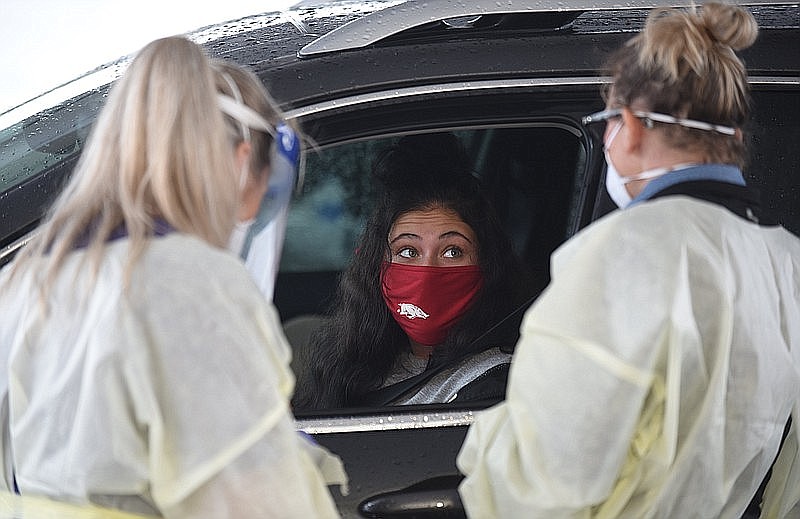Coronavirus infections appeared to be continuing to surge in Arkansas on Wednesday, with the count of cases rising by 1,459 and the number of covid-19 patients in hospitals rising for the 16th day in a row.
The state death toll from the virus, as tracked by the Department of Health, rose by 13, to 6,020.
“Our vaccination numbers are better this week, but hospitalizations and ventilator usage increased once again,” Gov. Asa Hutchinson said in a tweet.
“The vaccines protect against the Delta Variant, and we need everyone to do their part. Get the shot today to protect yourself and those you care about.”
The increase in cases was the state’s third-largest in a single day since February.
It followed a spike of 1,875 cases on Tuesday, which was the largest one-day new case total since Feb. 4.
The number of covid-19 patients hospitalized in Arkansas, on ventilators and in intensive care all rose by double-digits, with the numbers on the breathing machines and in ICU units reaching their highest levels since late January.
The number of hospitalized grew by 33, to 848, its highest level since Feb. 3.
The number on ventilators rose by 25, to 156, the largest number since Jan. 27.
The number in intensive care grew by 21, to 334, its highest level since Jan. 26.
The average number of cases added in the state each day over a rolling seven-day period rose to 1,173, its highest level since Feb. 10.
With new cases outpacing recoveries, the number of cases that were considered active rose by 428, to 11,903, the largest number since Feb. 13.
“They’re still moving in the wrong direction,” state Epidemiologist Jennifer Dillaha said of the state’s case numbers. “It’s very concerning.”
Based on numbers as of Tuesday, U.S. Centers for Disease Control and Prevention rankings on Wednesday continued to list Arkansas as the state with the most new cases per capita over a rolling seven-day period.
The 8,058 cases that were added to Arkansas’ count during the week ending Tuesday translated to a rate of 267 per 100,000 residents.
Florida had the next-highest rate, 264.2 per 100,000 residents, followed by Missouri, with 244.6 per 100,000 residents.
The national rate was 79.4 cases per 100,000 residents.
In deaths per capita, Arkansas fell from being tied with Montana for having the highest rate Tuesday to roughly tying with Missouri for the fifth-highest rate as of Wednesday.
Arkansas’ 37 deaths during the week ending Tuesday amounted to a rate of 1.2 per 100,000 residents.
Maine had the highest rate, 1.9 per 100,000 residents.
Also topping Arkansas in deaths per 100,000 residents were Montana with 1.6, Louisiana with 1.4 and New Mexico with 1.3.
The national rate was 0.5 deaths per 100,000 residents.
‘BREAKTHROUGH’ CASES
Health officials have blamed Arkansas’ recent surge in cases on its low vaccination rate and the fast-spreading delta variant that first emerged in India and has become the dominant strain in the United States.
Dillaha said the virus has been spreading in summer camps, workplaces and gatherings such as weddings and funerals, among other settings.
Since Jan. 1, she said, just 3.4% of the state’s cases, 4.6% of its covid-19 hospitalizations and 3% of its deaths from the virus have been the result of “breakthrough” infections of people who were fully vaccinated, meaning they tested positive at least two weeks after their final vaccine dose.
Recently, however, breakthrough infections have been on the rise.
In June, for instance, such infections accounted for 9% of the state’s cases, 9.7% of its covid-19 hospitalizations and 8.6% its deaths from the virus.
So far this month, they have accounted for 12.5% of the cases, 12.3% of the hospitalizations and 15.6% of the deaths.
“It’s really important for people to recognize that the more spread there is, the more transmission in the community, the more likely there is to going be breakthrough cases,” Dillaha said.
She also noted that studies have shown the vaccines have lower effectiveness against the delta variant than other strains.
“There is this tendency for people to think of vaccinations as an all or none — either it completely protects you, or it doesn’t protect you at all, kind of like a light switch,” Dillaha said.
“The better analogy I think is it works like a dimmer, that it reduces your risk for infection and also reduces your risk for severe disease if you have infection.
“How much it reduces it may depend on different things such as your health status, your age, but also it depends how much the virus is circulating in the community, and how much exposure you’re getting.”
Older Arkansans appear to be at a greater risk of such infections.
Among those age 65 and older, breakthrough infections have accounted for 8.4% of the state’s cases, 6.8% of its hospitalizations from covid-19 and 3.3% of its deaths from the virus since January.
“Even healthy older adults do not respond as robustly to vaccines as younger adults,” Dillaha said.

